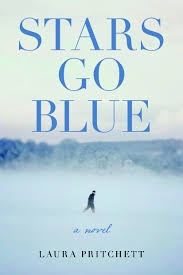
One reason why I wrote about my father’s dementia in The Washington Post last weekend and reprinted that personal account on my author’s blog was because I’d read an inspiring story in Publishers Weekly written by Laura Pritchett. An accomplished novelist, Pritchell said that she had drawn on her experience’s with her father, who has Alzheimer’s, in creating the main character in her new book, STARS GO BLUE. Her fictional character is slowly losing his mind to the illness.
….I wanted to write a novel based on my father. I also wrote to give him voice, which is why I made the decision to tell the story from his point of view (not an easy task, to tell a story via a diminishing mind.) I wanted him to say everything he wanted to say before the silence set in. Most of all, I wrote STARS GO BLUE to see him with renewed clarity, so that I could love him better and more deeply than every I had before.
Pritchett described in the article how she had watched her once vibrant father disappear during the last eleven years. Her father’s diminishing quality of life caused her to wonder whether his death would be a blessing.
I want my father to die…I have come to believe that real love involves deep honesty, and honesty demands my acknowledgment that his life is over.”
You need to read her article to understand the context of that statement and what brought her to such strong feelings.
I was deeply touched by her account, enough so, that I sent her an email — an author fan letter to another author. In a return email, she told me that she had read my book, CRAZY, and she graciously arranged for her publisher to send me a copy of STARS GO BLUE.
I decided to write about my own father’s struggles after admiring how frank and brave she was in talking about her father. I’ve discovered that this often happens when someone speaks out about difficult topics. One person’s honesty encourages others to join them in sharing their personal stories.
I’ve just started reading STARS GO BLUE and I’m impressed with how well Pritchett has integrated her experiences with her father into a compelling fictional narrative. Without giving away the book’s plot, her main character realizes that his mind is going and he wants to seek revenge against the murderer who killed his only daughter before all memory of her and the injustice of her death are gone. It’s a clever plot. 
Novels blend fact and fiction, yet few undertake as formidable challenge as Pritchett has in having her protagonist slowly losing his mind.
One of the best story-tellers who was able to infuse her fiction with information about mental illnesses was the late Bebe Moore Campbell. Her novel, 72 Hour Hold, accurately describes the problems that families face when trying to get an adult child, who doesn’t believe anything is amiss, into a psychiatric ward. Campbell was a founding member of NAMI-Inglewood and she wrote a fabulous children’s book, Sometimes My Mommy Gets Angry, in 2003 about mental illness. It won an award from the National Alliance on Mental Illness which also honored her posthumously after she died in 2006 from cancer.
Pritchett’s lyrical prose and keen storytelling accomplishes much the same as Campbell’s writings. She has created a fictional character who not only resembles her father but mine too. In doing so, she has helped me better understand my own father and myself and for that, I am grateful.



